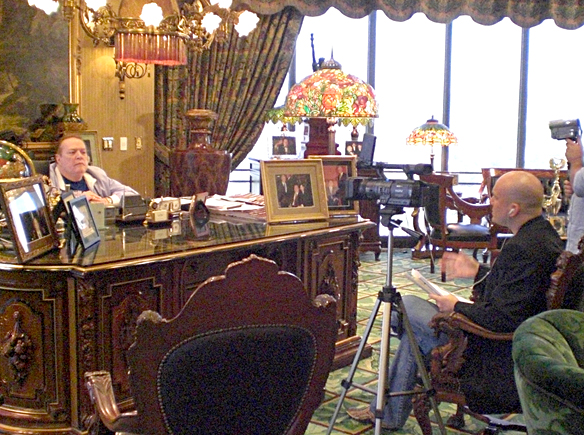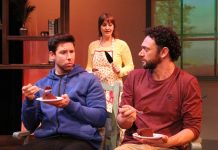‘Freeway City’ documentary to show Saturday at Gardena JCI
Gardena has long been known as the City of Opportunity with new businesses and residents moving in on a regular basis. But once upon a time it was known as the Freeway City, a place where card clubs reigned supreme and pioneers like Ernie Primm and Evel Knievel made Gardena the talk of the town for years to come.
‘Freeway City’ documentary to show Saturday at Gardena JCI
Gardena has long been known as the City of Opportunity with new businesses and residents moving in on a regular basis. But once upon a time it was known as the Freeway City, a place where card clubs reigned supreme and pioneers like Ernie Primm and Evel Knievel made Gardena the talk of the town for years to come.
To hear the story of the history of Gardena from filmmaker Max Votolato, one would get the impression that he was talking about Las Vegas or Atlantic City with ample talk of the importance of the card clubs to the city and how Ernie Primm, for whom Primm, Nevada is named, kept the city alive through his fight in favor of the card clubs.
It’s this kind of in-depth storytelling that can be found in “Freeway City,” a 90-minute documentary by Votolato that will be shown free of charge at the Gardena Valley Japanese Cultural Institute (JCI) on Saturday, March 26 at 2 p.m.
“From the standpoint of a filmmaker telling a story, it was virgin territory,” Votolato said. “No one had ever told the story before, certainly not on film.”
For 10 years, Votolato worked on his documentary, filming interviews with more than 35 people made up of local officials and residents and digging through old records in libraries all over Los Angeles in an effort to validate and verify the details of all the stories that his interviewees were telling him about Gardena.
“You interview one person and at the end of the interview, I would ask “Is there anyone else you think I should talk to? Votolato said.” “They would all have recommendations of people they knew who could tell me more about certain areas of interest.”
Some of the notable people Votolato talked to were former Gardena Mayor Don Dear, Hustler Casino owner Larry Flynt, and Gardena Chamber of Commerce member Tom Parks. Also in the film is footage of JC Agajanian talking about Gardena’s own Ascot Raceway, the site of Evel Knievel’s first televised jump.
Except for a $1,000 donation from the family of Russ Miller to cover production costs, Votolato financed the film himself. And while the financing was mostly a solo effort, Votolato received help in producing the film from Brian O’Neal, lead singer of the Bus Boys who grew up in Gardena and graduated from Gardena High School.
O’Neal, who serves as the film’s executive producer, became involved with the production of the documentary after Votolato showed O’Neal a rough cut of the film and then asked him to contribute a song for the movie. O’Neal did him one better and produced an entire soundtrack for the film which features one of his new singles: “City’s on Fire,” about the Watts riots.
Votolato is quite and clear and upfront when mentioning that the city did not commission this project and that he did it completely on his own. While some might consider that as a hindrance, for Votolato, it was actually a blessing. Being on his own allowed him room to explore the underbelly of Gardena, which included the city’s gambling history as well as more current challenges such as financial troubles and gang activity in the city.
“This film is not a travelogue,” Votolato said. “I wanted to paint an honest portrait of the city but I feel that they should be incredibly proud of its history. It’s not a very well-known history but the motivation for doing it was that I would tell people stories about what I’d heard about Gardena and people who have grown up in L.A., they didn’t know the stories.”
Because there was so much information that Votolato learned about the city during the course of making his film, he says he is ready to do a second documentary about Gardena. When pressed for details, Votolato was tight-lipped and would only say that interested parties should just “stay tuned.”
Currently, Votolato is seeking distribution for “Freeway City,” which has been available for free streaming since its November release on Vimeo via www.freewaycity.org, where he says it has had a huge response.
“I’m very proud of it and I hope the city will be very proud of it,” Votolato says. “One of my great hopes is that the film can benefit the city in terms of opening it up as a place of interest to people from outside of Gardena. I’d like to bring a spotlight to Gardena to showcase the legacy and history of the city.”
One of the things that Votolato said defined the city was its small town community atmosphere. In fact, after Votolato conducted each interview, he would always ask his interviewee one question: “What do you think the greatest assets of the city are?”
Without fail, the most common answer was: “our people” or “our community.”
What surprised him is that not one person answered with: “our history.”
“And I think that was one of my takeaways,” Votolato said. “The legacy of Gardena is fascinating and can be used as a marketing tool like you wouldn’t believe. If people were aware of how cool the city’s history was, people would want to live there, property values would rise. It could be used as a marketing tool and benefit everybody. This history is something that should be celebrated and I hope that the film could be a stepping stone and celebrate that legacy.”
The Gardena Valley JCI is located at 1964 W. 162nd Street in Gardena.
For more information about the “Freeway City” documentary, please visit www.freewaycity.org.



















